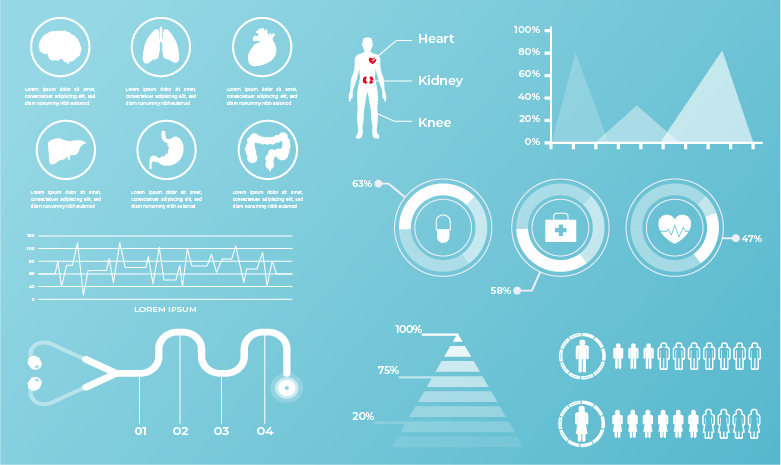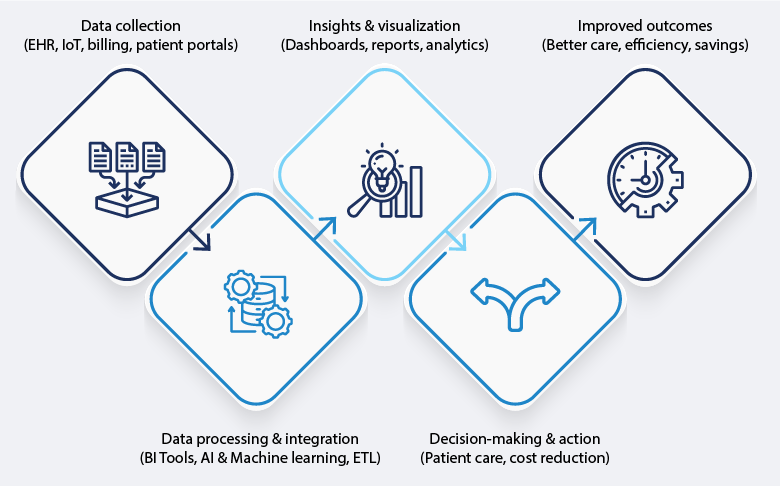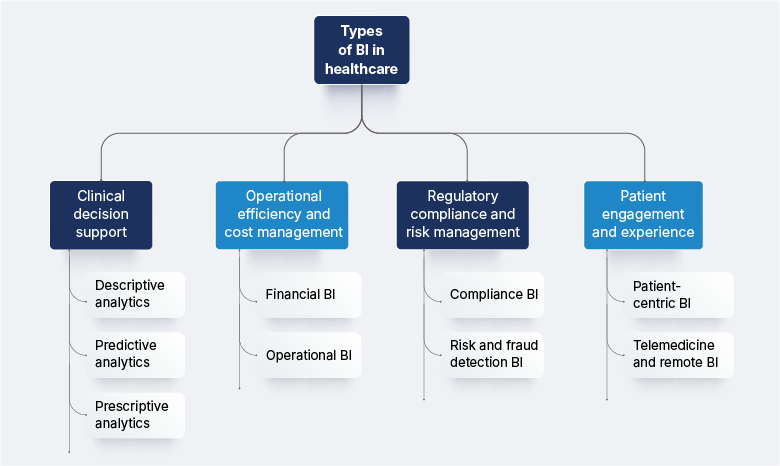

Data has become the lifeblood of modern healthcare, but without intelligence, it is like a heartbeat without rhythm, present but lacking purpose. Intelligence is the oxygen that gives data its rhythm and purpose, ensuring it drives meaningful outcomes in healthcare.
This leads to the question: What is the bridge that connects business intelligence (BI) and healthcare?
The answer lies in an intelligent conduit that seamlessly integrates data-driven insights with healthcare operations, transforming raw information into actionable strategies. Several solutions exist in this space, with Power BI leading the way. To enhance understanding and uncover its impact on patient care, operational efficiency, and data-driven decision-making, this blog explores the role of business intelligence in healthcare, how healthcare business analytics helps medical professionals, real-world use cases, and the future of BI in healthcare.
Before we explore its strategic role in transforming healthcare, let’s first establish a clear understanding of the basics.
What is BI in healthcare?
Business intelligence is used to deduce meaningful information from raw and unstructured data. It is a structured way to collect, analyze, and present accurate data for healthcare professionals to make informed critical decisions.
The medical field is filled with data. Collecting, analyzing, and interpreting takes time and each passing second can prove costly in critical moments. Business intelligence is the undertaking of all three activities and delivering output with speed and driving value in terms of better decision-making, improved patient care, and optimized operations.
From tracking patient health metrics in real time to forecasting disease outbreaks and optimizing hospital resource allocation, BI enables data-driven decision-making at every level. By integrating data from EHRs, IoT devices, and external health databases, it provides a comprehensive view of healthcare performance, allowing organizations to act proactively rather than reactively.
Role and importance of BI in healthcare
Business intelligence drives data-driven decision-making and operational efficiency. By aggregating and analyzing data from various sources, it empowers clinical enterprises to enhance patient care and outcomes through optimized practices while simultaneously strengthening operational agility and mitigating financial risks.
Staggered data sources ranging from electronic health records (EHR) and medical devices to insurance systems and patient portals, each hold vital pieces of information. While these may seem fragmented when viewed individually, together they create a comprehensive picture of a patient’s medical history.
Advancements in business intelligence in healthcare industry continue to redefine how medical institutions optimize resources and enhance care.
The key elements that make BI integration into the healthcare ecosystem a success are:
- Data collection
- Data processing and integration
- Insights and visualization
- Decision-making and action
- Improved outcomes
Let’s look at this illustration to see how BI transforms healthcare:

Let’s also have a look at some numbers that matter:
- 30% of the world’s data volume is generated by the healthcare industry – RBC Capital Markets
- $15.14 billion expected value of the global healthcare business intelligence market by 2027 – Emergen Research
- 8.1% estimated CAGR of the healthcare BI market between 2022 and 2032 – Future Market Insights
BI in healthcare is advantageous in terms of efficiency and savings, but more importantly, it helps deliver higher-quality patient care. An ecosystem thriving on data-driven insights strengthens a medical organization’s position as both a patient-centric caregiver and a benchmark in operational excellence.
Types of BI in healthcare
There are various segments in healthcare where business intelligence finds several use cases. Whether in clinical decision making, efforts to enhance operational efficiency, or adhering to compliance norms, healthcare organizations can use BI and continuously improve their practices, ensuring better health outcomes and patient experiences.
Healthcare professionals can implement the following types of BI in healthcare to optimize care delivery:

Exploring BI tools in healthcare:
Clinical decision support
By implementing BI, medical practitioners can visualize historical patient trends and use AI-driven forecasts for early disease detection and risk assessment.
Operational efficiency and cost management
BI financial dashboards with built-in cost-analysis capabilities help hospitals track expenses, billing cycles, and resource utilization to improve financial efficiency.
Regulatory compliance and risk management
Integration of Electronic Health Records (EHRs) with security protocols ensure maximum compliance with regulatory requirements standards and frameworks such as HIPAA, and GDPR.
Patient engagement and experience
BI consistently records patient in and out times, and monitors their satisfaction levels to help healthcare providers understand the areas with scope of improvement and take measures to improve patient experiences.
Looking for Microsoft Power BI consulting services?
Our Power BI developers can help you extract valuable insights from data, thus further enhancing data exploration and decision making. Our Power BI solutions simplify data infrastructure and help reduce costs.

Key use cases of BI in healthcare
From hospitals and city health departments to global health entities, business intelligence is empowering all stakeholders with data-driven insights for informed decision-making. BI finds its use in improving patient care as well as patient experiences. Let’s explore the key use cases of business intelligence in the healthcare industry:
Clinical decision support:
Enhancing medical decisions with AI-driven insights and real-time analytics, enabling accurate diagnoses and optimized treatment plans.
Patient engagement and experience:
Empowering patients with digital tools and personalized interactions, improving communication, adherence, and overall healthcare satisfaction.
INTEGRIS Health
A leading healthcare provider, INTEGRIS Health enhances both clinical decision-making and patient engagement by using real-time data for personalized care.
Predictive analytics for patient influx:
Forecasting patient demand to optimize resource allocation, staffing, and emergency preparedness for better care delivery.
AI4HealthyCities
A pioneering public health initiative by the Novartis Foundation, AI4HealthyCities applies predictive analytics to monitor urban health trends, helping cities prepare for patient influx and healthcare challenges.
Operational efficiency and cost management:
Streamlining operations and optimizing costs to improve financial sustainability and service efficiency in healthcare.
Regulatory compliance and risk management:
Ensuring regulatory adherence while mitigating risks to enhance patient safety, data security, and legal compliance.
Humana
A major health insurance and managed care provider, it integrates compliance frameworks with cost-management strategies to enhance operational efficiency while maintaining regulatory adherence.
Public health monitoring and disease prevention:
Tracking disease patterns and implementing proactive measures for early intervention, outbreak control, and long-term planning.
Kansas BRFSS:
A trusted public health data system, the Kansas Behavioral Risk Factor Surveillance System (BRFSS) provides population-level insights to identify health risks and guide preventive strategies.
Tracking and improving population health metrics:
Using data analytics to assess public health trends, support policymaking, and improve resource allocation.
WHO PHSMs dashboard:
A global health authority’s tool, the WHO Public Health and Social Measures (PHSMs) dashboard tracks key health indicators, offering insights for data-driven decision-making.
Enhancing diagnostic imaging with artificial intelligence:
Using AI for more accurate, efficient medical imaging, reducing errors, and enabling early disease detection.
BI trends in healthcare
Business intelligence is transforming decision-making at every level. It has evolved from static reports to dynamic and AI-powered insights, transforming decision-making at every level. The table below highlights this progression, showcasing how BI trends have shifted from past limitations to future innovations:
| Aspect | Traditional BI | Modern BI | Future BI |
|---|---|---|---|
| Data accessibility | Siloed data, limited real-time access | Integrated platforms with real-time dashboards | AI-driven, fully automated data pipelines |
| Analytics and insights | Historical reporting, static data views | Predictive analytics with AI and ML | Prescriptive analytics with proactive decision-making |
| User experience | IT-driven, complex BI tools | Self-service BI with intuitive interfaces | Natural Language Processing (NLP) for seamless insights |
| Interoperability | Fragmented systems with minimal integration | Cloud-based solutions enabling interoperability | Standardized global health data ecosystems |
| Personalization | Generalized reporting | Tailored analytics for clinicians & patients | Hyper-personalized, AI-powered recommendations |
| Security and compliance | Manual compliance tracking | Automated monitoring and regulatory reporting | Blockchain-based, tamper-proof data governance |
Future of BI in healthcare
Healthcare is moving beyond just reporting data. It is tapping into AI-driven insights to stay ahead. Automation, predictive analytics, and real-time decision-making are shaping the future of BI in healthcare, making patient care smarter and streamlining operations like never before.
Below is a comparison of how BI is used today versus its future trajectory:
| Aspect | Current BI in healthcare | Future BI in healthcare |
|---|---|---|
| BI tools used | Traditional reporting dashboards | AI-powered predictive analytics and automation |
| Accessibility | Limited to analysts & IT teams | Self-service BI for all healthcare professionals |
| Data sources | Mostly structured EHR and claims data | Integrated with IoT, wearables, genomics, and social determinants |
| Clinical decision support | Retrospective data analysis | AI-driven personalized treatment recommendations |
| Patient monitoring | Episodic tracking via hospital visits | Real-time health monitoring with IoT and AI |
| Predictive modeling | Basic forecasting using historical trends | Advanced AI models predicting disease risks and patient influx |
| Operational efficiency | Data-driven cost tracking and resource planning | AI-powered workflow automation and efficiency optimization |
| Regulatory compliance | Rule-based compliance checks | Automated risk assessments with real-time alerts |
Why Power BI is a game-changer for healthcare analytics
Power BI in healthcare is transforming the way organizations handle data, offering real-time insights and predictive capabilities that drive better patient care, cost management, and operational efficiency. By integrating advanced business intelligence tools in healthcare, professionals can make data-driven decisions with greater speed and accuracy.
The table below highlights key features of Power BI and the benefits they bring to healthcare analytics.
| Feature | Healthcare benefits |
|---|---|
| Real-time data visualization |
|
| AI-driven predictive analytics |
|
| Self-service BI and intuitive dashboards |
|
| Integration with EHR and other data sources |
|
| Automated reporting and compliance monitoring |
|
| Secure and scalable cloud-based platform |
|
| Natural language query and AI-powered insights |
|
Adopt business intelligence and elevate healthcare outcomes
With further innovation in business intelligence and continuous AI-enhancement, AI-driven business intelligence is set to give the healthcare industry a complete overhaul by transforming diagnostics, enabling early disease prediction, and accelerating medical research.
Businesses who understand the significant value of BI must not only plan to implement it in their systems, but also consider customizations that can help them deliver insightful and improved patient care.
The next step in order for any healthcare professional is to talk to an experienced BI consulting service provider to learn how they can improve patient outcomes and elevate medical support. Softweb Solutions has a team of expert Power BI consultants with decades of experience in delivering customized solutions that augment your operational competence.
Need Help ?
We are here for you